Falcon's Flight Read online
Dear Reader:
Series and Spin-offs! Connecting characters and intriguing interconnections to make your head whirl.
In Joan Hohl’s successful trilogy for Silhouette Desire— Texas Gold (7/86), California Copper (10/86), Nevada Silver (1/87)—Joan created a cast of characters that just wouldn’t quit. You figure out how Lady Ice (5/87) connects. And in August, “J.B.” demanded his own story—One Tough Hombre. In Falcon’s Flight, coming in November, you’ll learn all about...?
All the best,
Isabel Swift
Senior Editor & Editorial Coordinator Silhouette Books
JOAN HOHL
Falcon’s Flight
To my daughter and new son-in-law: Amy and Clifford Kline Be happy, kids.
One
The sign swayed precariously in the sharp October wind. The guy wires tautened and the sign stilled, then began ascending again toward its final resting place at the top of the tall building.
Standing on the famous boardwalk, broad back to the cold wind whipping off the Atlantic Ocean, straight black hair flying wildly around his gaunt, hatchet-hewn face, Flint Falcon watched the proceedings through dark, narrowed gray eyes. A gust of wind set the sign dancing. The motion accented the logo of a dark bird, wings spread in flight, soaring into the promise of the endless day on the sign’s bright blue background.
The barely discernible movement of thin but perfectly defined male lips formed a smile on Falcon’s grimly set mouth. The sight of the swaying sign pleased him. Of course, the bird was a falcon. The flight was of the imagination. The endless blue sky represented the absence of time. In a gambling casino there is no time—except, perhaps, to play.
Releasing his visual lock on the sign now being anchored by the workmen, Falcon slowly lowered his intense gaze, his narrowed eyes searching for flaws in the structure. There were none, as he was well aware.
From a large, square, multistoried base, the tower rose majestically into the mist-shrouded sky, slim, straight, the tallest building to date to etch the skyline of Atlantic City, New Jersey.
The tall, slender edifice did not symbolize indulgence of whim. To Falcon the towering building was a monument to perseverance and sheer hard work— his own. It had been a long haul for him, over paths strewn not with stones and rocks but with boulders. The gleaming, buff-toned tower, standing above its counterparts, represented personal achievement to Falcon. Against seemingly insurmountable odds, Flint Falcon had emerged tall and strong, not only unbroken but unbowed. He had won. The proof of his victory rose in grandeur for all to see.
“That’s it, Mr. Falcon.” The work-crew foreman hailed Flint from the other side of the boardwalk. “The sign’s secure. Falcon’s Flight is ready to take off!”
“Thanks, Morrisey.” A slashing grin altered the expression on Flint’s face, lending animation to the granitelike visage. Raising a hand, he returned the foreman’s wave; then he swept his gaze up the tall spire to the sign.
The last of the interior work on the building had been completed earlier that week. For all practical purposes, Flint could have opened for business weeks ago. He had adamantly refused to consider it. There had been a holdup on the sign. Flint chose to wait for it. The sign was important. It was his personal mark on the monument. Business as usual would not commence until the sign was firmly affixed.
Tonight Flint would host a second and final party. Like the one he had held last night, it would be a rather unusual affair. The party was for employees exclusively. Since the hotel-casino employed such a large number of regular full-time people and an almost equal number of part-timers, two separate parties had to be given to accommodate them. In good spirit, the employees feted the night before would now turn around and serve the servers.
Not only did Flint have his priorities straight, he knew exactly how to line up his ducks in a row. The customers were of the utmost importance and were to be catered to to the nth degree—or as far as the law allowed. The question of morality didn’t enter into it. Flint left the moral issues to each individual and to the theologians. His own conscience was clear. But, as important as the customers were, Flint also knew that without his employees there would be no business to speak of.
As they had been the previous night, the party arrangements were elaborate and lavish. Also as he had the previous night, Flint planned to make a token appearance, then cut out. Parties, even those thrown by him, were definitely not Flint’s style.
His long legs making short work of the distance, Flint strode across the boardwalk and through an open doorway. The wide plate-glass door was held open for him by a uniformed security guard who was well into middle age, though that fact was not revealed by the man’s trim, muscular physique or his cool, alert eyes. As were most of the other security people, the guard was a retired law officer, this particular man from the highway patrol of a western state. Flint did not surround himself with inept, untrained security, male or female.
The guard dipped his head respectfully as Flint paused to scrutinize the spotlessly clean silver-and-black decor of the thirty-foot-wide lobby. The room separated the smoked-glass doors along the famous boardwalk from the silvered entrance doors to the spacious casino.
“Sign okay, Mr. Falcon?”
A hint of a smile eased the unrelenting sternness of Flint’s lips at the note of concern in the guard’s neutral tone. The permanent employees numbered several thousand. Incredibly, most of them were aware of how important the sign was to their employer.
“The sign’s in place,” Flint replied, grasping the long, smooth silver handle on one of the entrance doors. “Why don’t you step outside and have a look at it?” he asked as he swung the heavy door open.
“Will do, sir,” the guard responded with a grin. Though he wanted to see the sign, the man wouldn’t have left his post in the lobby for a second without Flint’s permission.
With a barely discernible nod of his head, Flint entered the hushed interior of the casino, which encompassed nearly forty thousand square feet of floor space. His narrow-eyed gaze missing nothing, Flint strolled along the wide central aisle that ran the length of the huge room from the boardwalk entrance to the corridor that branched off to the hotel’s expansive registration lobby, which faced Pacific Avenue, one block off the boardwalk.
Flint’s own personal choice of silver and black was carried throughout the casino and hotel lobby, the severity relieved by splashes of brilliant crimson. The colors were reversed in the employees’ uniforms; crimson predominated, and the trim was in silver and black. On Flint’s instructions, the interior design and decoration of the entire complex was stark in comparison to the opulence of the other hotel casinos that lined the boardwalk. But Falcon’s Flight reflected exactly the tone of simple elegance Flint had desired to convey.
Before veering off into the lobby corridor, Flint paused to run a final glance over the large, silent room, savoring the sense of accomplishment that swept through him. Within twenty-four hours the room would undergo a drastic change. The silence would be broken by the muted roar from the collective throats of eager-eyed gamblers, both novice and experienced. Added to the human cacophony would be the rattle of slot machines, the low, clear call to play of dealers and croupiers and the music blaring from the strategically positioned bar-lounges around the perimeter of the casino. The anticipation of activity and of money changing hands on the morrow pleased Flint.
Satisfaction glittering in his eyes, Flint strode to midway along the corridor, then turned right into a shorter hallway that ended in a cul-de-sac and an unmarked door that had no doorknob. Drawing a narrow strip of plastic from his pocket, he inserted it into an equally narrow slit in the doorframe. A series of clicks could be heard in the hushed atmosphere; then the unmarked door slid n
oiselessly into the wall to reveal a small elevator. Entering the lift, Flint pressed the only unmarked button on the panel, which contained six columns of numerically marked buttons. Flint lifted the receiver of the black phone mounted on the wall as the door slid shut.
“This is Falcon,” he said when his secretary responded. “I’ll be in my office if you need me.”
“Yes, sir.” The response was quick, brisk and masculine.
Replacing the receiver, Flint watched the floor numbers scroll up in a tiny window above the door. The conveyance came to a smooth, soundless stop when the letters PH flashed behind the small pane. The door slid back, and Flint stepped onto the thick carpet that covered the floor of a wide area in front of the elevator, then continued along another corridor that dead-ended at a large window. There were two doors visible, one near the window at the end of the hallway and one directly opposite the elevator.
Sliding the plastic strip from his pocket once more, Flint crossed to the crimson-painted door opposite the lift. As he slipped the plastic strip into a narrow slot set into the door, his gaze skimmed over the two tall, gleaming black-and-silver glazed vases that flanked it. Making a mental note to congratulate the head of the housekeeping department for a job well done, Flint pushed the door in and entered his private domain.
Comprised of two levels, the enormous apartment contained four bedrooms, each with a private bath, a square, spacious living room with an adjacent powder room, a formal dining room, an intimate dining room, a large eat-in kitchen and Flint’s office suite, which contained a full bath and a small dressing room.
Flint smiled sardonically every time he entered the place. Not too many years before, Flint’s living quarters had consisted of a jail cell that had not been as roomy as his office bathroom, and he had shared that cell with another man. At the time, Flint had yearned for a place of his own; he hadn’t wanted much, just one room entirely his own. The irony of it all amused him.
As usual, Flint paused on the landing as he quietly closed the door. He didn’t notice the thicker, more lushly piled carpet under his two-hundred-dollar shoes, or that the carpet continued down the three steps into the austerely decorated, starkly beautiful living room. Flint had been in residence in the apartment for over a month; he had grown used to the black-silver-and-red elegance of the room. But what Flint had not grown used to, what always made him pause, was the spectacular view afforded by the floor-to-ceiling wall of glass opposite the entrance.
From his vantage point on the landing, Flint couldn’t see the city streets, the boardwalk or even the expanse of grayish-beige beach. His eyes darkening to near black with a feeling resembling hunger, Flint’s gaze drank in the panorama of ocean and sky stretching out in all its grandeur to the horizon.
j Freedom. Space. The view offered Flint the two intangibles his soul craved. While serving time in a claustrophobic cell, Flint had vowed he would die before he ever lost his freedom again. Flint had also vowed to create his own space—to create an environment where he could metaphorically spread his wings and soar like the Falcon he had been named for.
Flint had no idea how long he stood absorbing the view, nor did he care. There was work to be done, calls to make, contracts to study. A tiny smile of satisfaction cracked his set expression. The work would be dispatched when he decided to do it.
Flint Falcon owned fifty-five percent of the hotel casino, which had cost a total of two hundred and eighty million dollars to build. Flint Flacon took orders from no man.
“You look completely wrung out, Leslie.”
Sitting back in the seat, Leslie Fairfield smiled absently at the waiter who had just refilled her coffee cup. As the young man turned away from the table, Leslie turned to the woman seated across the table from her.
“You sound like a mother,” Leslie chided her friend in an affectionate tone.
“I am a mother,” the slightly overweight woman retorted. As she placed her delicate tea cup in the saucer, the rattle of the china betrayed her agitation. “I’m also your best friend, and I’m worried about you.” She frowned, the expression forming tiny lines at the corners of her soft brown eyes.
Her own green eyes darkening with emotion, Leslie reached across the table to grasp her friend’s hand. “I don’t want you to worry about me, Marie. I promise you I’m perfectly all right.” A spark of amusement flickered in Leslie’s eyes. “You have enough to occupy your time keeping up with that three-year-old dynamo son of yours, not to mention the dynamo’s father, without adding me to your list of concerns.” The gleam in Leslie’s eyes took on a devious glow. “How is Tony Sr., by the way?”
“Tony Sr. is fine.” Marie Ferrini frowned her impatience. “And don’t change the subject. I am concerned about you.” Her full lips tightened. “You look beat. You need a break from the pressure.”
“I know,” Leslie said. She took a sip of the hot coffee in the cup before continuing. “I have four more performances, then I’ll be finished with the play.” “You’ll be missed,” Marie said warmly. “Your reviews have been terrific. ‘Not since the magnificent Kathryn has a beautiful redhead so graced the boards,’” Marie said with a flourish, quoting the praise of one usually acerbic critic.
“Umm,” Leslie murmured and smiled with satisfaction. “I’m grateful for the good reviews, but I know when it’s time to bow out.” Her smiled faded. “It’s getting stale. I no longer am the character, I’m merely playing the character.”
Marie’s nod conveyed understanding; an actress herself, she could easily understand her friend’s waning enthusiasm. Leslie had been performing her current role for ten months without missing a single performance. Since the play was about the sympathetic relationship between two women helping each other deal with the devastation of divorce, Leslie was onstage for almost every scene. There was also the added factor of Leslie’s emotional involvement with the role, as she had suffered through the same form of devastation as the character she played. Marie silently cursed Leslie’s former husband for the damage he had inflicted on the actress.
Consigning Leslie’s ex-husband to the hell she believed he richly deserved, Marie smiled brightly. “So, what are your plans?” But before Leslie could answer, she added chidingly, “1 hope you’re not even thinking about another long-running play!”
Shaking her head, Leslie drew a long cigarette from a gold-toned case and lit it before responding. “No, I’m not.” She exhaled sharply, then continued, “I’m thinking about a long-running vacation.”
“You need it,” Marie observed, frowning as she watched Leslie puffing nervously on the cigarette. Though Leslie’s personal experience with divorce had added depth to her portrayal of the demanding role, the cost had been high to her physical and mental health. In Marie’s opinion, Leslie was very near the breaking point.
“I know.” Leslie crushed out her cigarette, then immediately lit up another. “Although doing the play was exhilarating, it was also exhausting. I’m tired.” Her mouth curved in a wry smile. “But I feel restless, unsettled, oddly dissatisfied....” Her voice faded, and she sighed.
Marie gave an echoing sigh. “I’d say it’s time you took a vacation. Have you considered a cruise?” she asked.
“No.” Leslie grimaced. “While I like looking at the ocean, I have no desire whatever to be either in it or floating on top of it.” Her lips smoothed into a smile.
“I will be seeing the ocean, though. I’ve reserved a room at a casino hotel, and I’ll be leaving for Atlantic City the day after my swan-song performance.” “You’re going to the seashore in October?” Marie’s incredulous expression drew a soft burst of laughter from Leslie. “My plan is to make a splash at the tables, not in the ocean,” she chided.
Marie didn’t join in with Leslie’s laughter. Her lips turned down in a deepening frown. “Didn’t you spend three entire nights gambling in Las Vegas while you were staying with your cousin Logan in Nevada last fall?” she asked suspiciously.
“Yes,” Leslie replied cal
mly. “Why?”
“Well...” Marie drew the word out.
“Well what?” Leslie asked, lighting yet another cigarette.
“And didn’t you make several quick trips to Atlantic City since then?” Marie went on doggedly.
Leslie smiled sardonically. “More than several----
So?” she asked, impatiently.
“Sooo.” Marie wet her lips, then blurted out, “I just hope this gambling thing isn’t becoming compulsive with you.”
“Compulsive?” Leslie looked stunned for an instant, then the delightful sound of her husky laughter filled the air. “Oh, Marie!” she gasped. “What would I do without you?”
“I have a sneaky suspicion that you’d manage very well,” Marie retorted, flushing with pleasure.
A gentle smile replaced the laughter on Leslie’s soft lips. “Dear friend, I assure you that I’m in no danger of becoming a compulsive, wild-eyed gambler.” Sobering, she crushed out her cigarette, then swallowed
the last of her now-tepid coffee. “The money I spend in the casinos means nothing to me—as you know.” Her elegant eyebrows peaked questioningly.
Marie had little choice but to nod. All of Leslie’s friends were aware of her attitude toward money, and they had all benefited from it in one form or another. The only value money had for Leslie was the pleasure she derived from it, whether spending it on herself or lavishing it on her friends in gifts or outright loans. On being chastised or teased for her lack of thriftiness and failure to prepare for the future, Leslie’s response was always the same: Life is really very short, and there are no pockets in a shroud.
Like most humans afraid to face the fact of her own mortality, Marie despaired of Leslie’s attitude and continued to squirrel away every extra dollar against the nebulous mirage of tomorrow. And she continued to frown at Leslie’s imprudent life-style.
“Don’t glower at me,” Leslie pleaded, unsuccessfully hiding a wicked grin. “Will it relieve you to know that I really haven’t gambled away all that much money?”

 Maverick
Maverick Thorne's Way
Thorne's Way Thorne's Wife
Thorne's Wife Window on Yesterday
Window on Yesterday Cutting Through
Cutting Through Come Home To Love (Harlequin Signature Select)
Come Home To Love (Harlequin Signature Select) The Game Is Played
The Game Is Played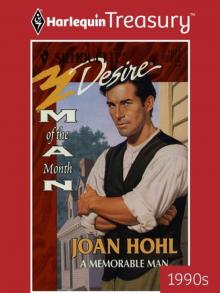 A Memorable Man
A Memorable Man A Man Apart
A Man Apart While the Fire Rages
While the Fire Rages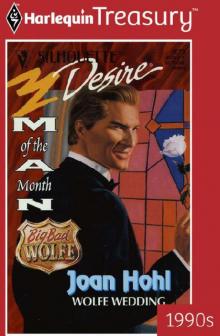 Wolfe Wedding
Wolfe Wedding In the Arms of the Rancher
In the Arms of the Rancher Forever Spring
Forever Spring Window on Tomorrow
Window on Tomorrow The M.D.'s Mistress
The M.D.'s Mistress Beguiling the Boss
Beguiling the Boss Breeze off the Ocean
Breeze off the Ocean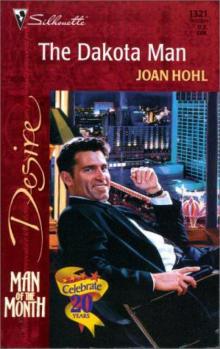 The Dakota Man
The Dakota Man Wolfe Wanting
Wolfe Wanting Falcon's Flight
Falcon's Flight Power and Seduction
Power and Seduction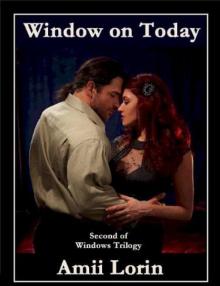 Window on Today
Window on Today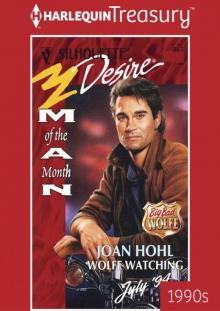 Wolfe Watching
Wolfe Watching